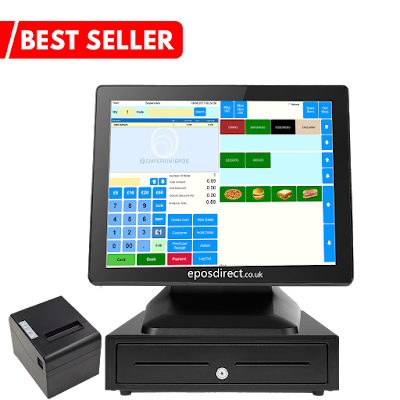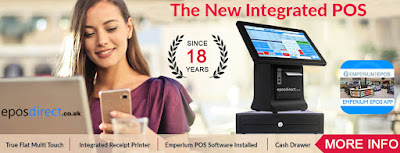Staying on the top of inventory
management is the most important for brands with multiple stores and a
multi channel way to deal with sales.
As per Wasp Barcode, 46% of small
businesses either never track their inventory at all or do as manually. In case
if you're using inventory management software in your retail business, you're
now on the right track.
Once when you've implemented the right
tools though, it's dependent upon you to set up workflows and automation's to
make your epos software work
proactively for you. One way to do that is with stock alerts.
Below, we'll look at what stock alerts
are, and why they are important. How you can use them internally and on the marketing
side of your retail business.


What
are stock alerts?
Stock alerts, also referred to as
inventory alerts, let you know when there has been a significant or essential
change in your level of inventory. Many businesses leverage low-stock alerts, but
there are many types as well, including alerts for:
· New
shipment
· Slow
moving stock
·
Bilk
or huge order
·
Inventory
reorder point
Which alerts are best for you
will depend upon the nature of your product, business, and retail operations?
A lot of inventory management
software’s have the stock alert feature. Typically, a warning is sent to a specific
individual, or group of people, when a product meets the parameters set for a
given alert.
Value
of stock alerts
Running out of stock is an
undeniable and costly issue retailer’s face. Businesses lose 1.75 trillion
every year to out-of-stocks, overstocks and returns. Think about this: Almost a
quarter of Amazon's retail revenue comes from shoppers who attempted to buy a
product in-store, but couldn't find it in stock. Stock alerts are designed to help
retailers to keep away from this problem.
Stock alerts are valuable beyond
helping keep items in stock. They also lessen a lot of susceptibility to human error
and time constraints by automatically keeping you apprised of effective changes
in stock levels.
By optimizing your inventory
levels it helps you earn more profits, you can use your warehouse and storage
space more effectively, and reduce holding costs or missed sales.
In case if you're managing online
and offline channels, in various locations, or both, stock alerts can enable
you to make sure each store location has enough stock on hand to meet the
demand.
4 ways you can use stock alerts in your retail business
Maintain
operational control
Stock alerts can help you and your
team stays in control logistically. Fewer last-minute orders and more automated
epos system create consistent retail
operations and help your team more effectively manage stock.
"If your low-stock alert
lets you a product is low when there's one remaining, unless you pay for rush
shipping on your new order, you may still experience a stock out" said by Meaghan
Brophy, senior retail analyst.
Brophy also proposes using a
higher threshold for your most popular and fast selling items, as well as items
you frequently run out of it. If reloading frequently is too costly, consider negotiating
a better price with your provider for bulk orders.
"Many suppliers will offer discounts
for bigger orders," says Brophy. "That is a great opportunity to boost
your margins and gain even more profit from your best-selling items."
Know
when to raise or lower prices
A lot of low-stock alerts for
specific products can indicate it's a good time to increase prices. In the
meantime, a stock alert for aging inventory could mean it's a great opportunity
to run a promotional discount.
This approach has worked well for
Misha Kaura, who owns an eponymous fashion brand and often uses pop up shops to
connect with customers in person. Kaura's customers have a small window of
opportunity to buy products she just makes 800 of each dress in her ready
to-wear collections and only four in her made-to-measure collections one
reason she has used low-stock alerts since beginning her business.
"I'm maintaining a luxury
business, and I want to limit overexposure," Kaura says.
“As a result, I have increased the
prices when the stock is low as it’s on the verge of being a collector’s
product.”
Stay
organized during busy selling periods
Busy selling periods, regardless
of whether the winter holidays or another seasonal surge, pose great sales opportunities
but in addition bring logistical challenges. Unpredictable demand, higher
volume, and temporary staff who don't exactly know the in sand outs of your
business are a couple of contributions to the chaos of these times.
These periods come and go quickly,
so it's essential to be able to react to the opportunities they provide quickly.
Stock alerts can enable you to stay notified of fluctuations in stock so you
can create promotions, pricing, and merchandising for slow moving stock, giving
your buying team some breathing space for fast moving items.
United By Blue implemented
low-stock alerts for the first time prior to 2018's Black Friday Cyber Monday
season. Thus, the retailer had to inform online customers of products that were
running low, which helped customers into United By Blue's physical store to
search for items that were sold out online.
Drive
sales
As in the last example, you can
use stock alerts as a marketing strategy to drive sales, both online and in-store.
Luxury candy brand Sugarfina allow
its customers visiting its website to sign up and get in-stock alerts so they
can learn when an item's inventory is replenished and available for purchase.


